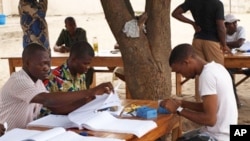The presidential poll in the small West African country of Benin has been delayed for a second time this year, as the electoral commission works to add more than one million voters to its electronic voters lists.
Benin was first scheduled to have a presidential poll in late February, but logistical problems, including concerns that more than one million people were left off the voting roll, have now pushed the vote to March 13.
The head of the electoral commission, Joseph Gnonlongorun, blamed the delay on not being given enough time to prepare.
The commission is supposed to have two months before an election to set up polling stations and distribute voting cards, but Gnonlongorun said he barely had more than a month. He says the commission is working hard to make sure the vote is not postponed again.
The electoral commission chief called the situation "embarrassing" but says they will find a solution. He says everyone at the electoral commission believes they must go into overdrive so that a transparent election can take place.
Eurasia Group researcher James Clinton Francis says flooding in October 2010 is to blame for destroying much of the country's electoral registry and many of its voting machines. But other problems started to add up as well.
Francis says for incumbent President Boni Yayi, who is running for his second term, the delay is a strategic decision to ensure the poll is perceived as free and fair.
"He does not want to see an Ivory Coast-like situation bubbling up in Benin. Yayi is playing a very crucial role in the mediating process in Cote d'Ivoire. I think any sort of mass or popular discontent with voting, the voting process, would be perceived negatively in the country," he said.
Yayi has grown increasingly unpopular in the wake of a Ponzi scheme exposed last year that affected an estimated 2.5 million Beninois, about a quarter of the population. Many people lost their life savings and some accused President Yayi of involvement, after pictures of him surfaced with other figures implicated in the scandal.
The opposition, which makes up a majority of the legislature, fell just five votes short of the two-thirds majority needed to bring impeachment charges against Yayi after the scandal broke.
But even with an emboldened opposition, Francis predicts a Yayi victory. He says the opposition has been unable to coalesce around a candidate with national appeal to run against the president.
"Currently there are two presidential nominees from the opposition coalition that represent northern and southern contingencies, but they have been unable to unite the country," he said.
Francis says it could take anywhere from another week to, at most, a month for Benin to ensure the technical parts of the election process are done correctly. Legislative elections are also due in April.
Multiple Problems Delay Benin Vote Again




